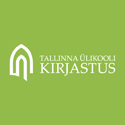- Focus and Scope
- Section Policies
- Peer Review Process
- Open Access Policy
- Toimetusolleegium / Editorial Board
Focus and Scope
Eesti Sõjaajaloo Aastaraamat on 2011. aastal asutatud ja kord aastas ilmuv eelretsenseeritav teaduskogumik, mida annavad välja Eesti sõjamuuseum - kindral Laidoneri muuseum ja Tallinna Ülikooli Kirjastus. Kogumiku sihtgrupiks on sõjaajalooga tegelevad õpetlased nii Eestis kui ka välismaal, ühtlasi ka laiem sõjaajaloohuviliste ring Eestis.
Eesti sõjamuuseum - kindral Laidoneri muuseum avaldas aastatel 2002–2007 jätkväljaannet Laidoneri muuseumi aastaraamat (numbrid 2001/1–2006/6). Eesti Sõjaajaloo Aastaraamat on selle väljaande järeltulija.
Eesti Sõjaajaloo Aastaraamatu artiklitele on kodulehel vaba juurdepääs. Lugejad võivad artikleid alla laadida, lugeda, kopeerida või välja trükkida ilma toimetuselt või autorilt selleks luba küsimata.
***
Estonian Yearbook of Military History (est. 2011) is an annual peer-reviewed journal of military history. Each issue of the journal focuses on a certain topic, which is always determined by the topic of the military history conference held by the Estonian War Museum – General Laidoner Museum the year before.
The journal is usually divided in two parts, the first of which comprises the conference proceedings while in the second part papers adressing various other questions of military history can be found.
Estonian Yearbook of Military History is a successor of Yearbook of Estonian War Museum – General Laidoner Museum (issued 2001–2007, ISSN 1406-7625).
Estonian Yearbook of Military History provides open access to its content. Users are allowed to read, download, copy, or print full texts of the articles in this journal without asking prior permission from the publisher or the author.
Section Policies
Articles
Reviews
Peer Review Process
Kõik artiklid läbivad pimeretsenseerimise.
Retsensendid ja toimetajad ei tohi artiklitele hinnangut anda autori soost, rassist, usukuuluvusest, rahvusest, seksuaalsest orientatsioonist, kodakondsusest või poliitilistest vaadetest lähtuvalt.
Toimetajad võivad jagada käsikirjaga seotud mis tahes informatsiooni ainult autoritele endale, retsensentidele või potentsiaalsetele retsensentidele, toimetuskolleegiumi liikmetele, teistele sama käsikirja toimetajatele või kirjastajale.
Toimetus ei aktsepteeri seda, kui autor pakub avaldamiseks artiklit, mis on mõnes teises väljaandes juba ilmunud või mis kirjeldab täpselt samu uurimistulemusi, mis on varem juba ilmunud. Sama käsikirja mitmesse väljaandesse esitamist käsitletakse kui ebaeetilist käitumist. Samuti peavad autorid tagama selle, et kõik kasutatud allikad oleksid viidatud ja et kõikidel refereeringutel ning tsitaatidel oleksid korrektsed viited.
Kui retsensendid on teinud ettepaneku käsikiri avaldada, kuid ümbertöötamisega, suunatakse käsikiri ümbertöötamiseks. Kui retsensendid on soovitanud käsikiri tagasi lükata, siis käsikirja töösse ei võeta. Kui üks retsensent on soovitanud käsikiri tagasi lükata, teine aga avaldada või avaldada ümbertöötamisega, siis teeb otsuse sarjakolleegium. Kui üks retsensent on soovitanud käsikirja avaldada, teine aga avaldada peale ümbertöötamist, ei tähenda paranduste sisseviimine automaatselt, et tekst avaldatakse, vaid vaja on retsensendi nõusolekut. Kõikidel juhtudel peab lõpliku heakskiidu käsikirjale andma sarjakolleegium.
***
All articles will undergo blind reviewing by anonymous reviewers. The reviewers and editors evaluate manuscripts for their content without regard to race, gender, sexual orientation, religious belief, ethnic origin, citizenship, or political philosophy of the authors.
The editors never disclose any information about a submitted manuscript to anyone other than the corresponding author, reviewers, potential reviewers, other editorial advisers, and the publisher.
- Members of the editorial board of or experts recommended by them, act as peer-reviewers. If a member of an editorial board of a series offers his or her own manuscript for publishing, then reviewers are appointed by the rest of the board without his or her participation. Only publications that have passed the peer review process are published in the journal.
- The journal retains the right not to publish a manuscript if two reviewers do not approve the text and/or the quality does not meet the standards.
- The peer review process is unilaterally anonymous, and the name of the reviewer will not be made public.
- A reviewer can recommend accepting or rejecting a proposal. A reviewer can also recommend publishing a manuscript (with the right to recommend revision), reconsider publishing it after major revision, or reject it.
- If reviewers recommend publishing a manuscript, but one of them asks for major revisions, the manuscript must be revised. If reviewers recommend rejecting a manuscript, it will be rejected. If one reviewer recommends rejecting a manuscript and the other recommends publishing, or publishing with revisions, then the editorial board shall make the decision. If one reviewer recommends publishing a manuscript and the other asks for major revisions, revising the manuscript does not guarantee that it will be published – the revised manuscript must obtain the reviewer’s approval. The editorial board gives final approval for all manuscripts.
- Disagreements that occur during the peer review process will be resolved by the editorial board.
Open Access Policy
This journal provides immediate open access to its content on the principle that making research freely available to the public supports a greater global exchange of knowledge.
Toimetusolleegium / Editorial Board
Prof. Karsten Brüggemann (Tallinna ülikool / Tallinn University)
Dr. Ago Pajur (Tartu ülikool / Univesity of Tartu)
Dr. Oula Silvennoinen (Helsingi ülikool / University of Helsinki)
Dr. Tõnu Tannberg (Tartu ülikool / Univesity of Tartu)
Prof. emer. Seppo Zetterberg (Helsingi/Helsinki)

